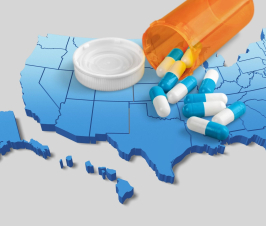In a very interesting editorial in the New England Journal of Medicine, a 1980 letter on the use of narcotics in hospitals and addiction is implicated as a commonly misquoted source that has supported the widespread prescribing of opioid medications.1 The letter, written by Jane Porter and Hershel Jick, MD2is included below in its entirety. The letter, explains Jick, was intended to address the short term use of narcotics in hospital patients. The research cited in the letter includes patients with as little as a single dose of narcotic medication, and the hospital stays of the nearly 12,000 patients was relatively short, for those receiving multiple doses.
The Single Paragraph Letter
The single paragraph letter was relatively “inconsequential,” says Jicks, until the 1990’s, when the manufacturer of OxyContin and other pain-killer manufacturers began citing it as evidence that these drugs were not addictive. The letter has been cited over 600 times and in more often than not is misrepresented in favor of prescribing opioid medications without concern of addiction. Those who have cited it seldom account for the exclusive use of narcotics within a hospital setting implied within the letter, or the duration of medication use.
This Letter Helped Shape Narrative About the Risk of Addiction
The editorial last month concludes that this letter played a large role in “helping shape a narrative that allayed prescribers’ concerns about the risk of addiction associated with long-term opioid therapy.” A very interesting piece of history, as well as an example of not believing everything that’s “cited.”
ADDICTION RARE IN PATIENTS TREATED WITH NARCOTICS2
To the Editor: Recently, we examined our current files to determine the incidence of narcotic addiction in 39,946 hospitalized medical patients’ who were monitored consecutively. Although there were 11,882 patients who received at least one narcotic preparation, there were only four cases of reasonably well documented addiction in patients who had a history of addiction. The addiction was considered major in only one instance. The drugs implicated were meperidine in two patients, Percodan in one, and hydromorphone in one. We conclude that despite widespread use of narcotic drugs in hospitals, the development of addiction is rare in medical patients with no history of addiction.
JANE PORTER
HERSHEL JICK, M.D.
Boston Collaborative Drug
Surveillance Program
Boston University Medical Center
Waltham, MA 02154
Sources
- Leung PTM, Macdonald EM, Stanbrook MB, Dhalla IA, Juurlink DN. A 1980 Letter on the Risk of Opioid Addiction. N Engl J Med. 2017;376(22):2194-2195.
- Porter J, Jick H. Addiction rare in patients treated with narcotics. N Engl J Med. 1980;302(2):123.
Image Copyright: <a href=’https://www.123rf.com/profile_lightwise’>lightwise / 123RF Stock Photo</a>
 Node Smith, associate editor for NDNR, is a fifth year naturopathic medical student at NUNM, where he has been instrumental in maintaining a firm connection to the philosophy and heritage of naturopathic medicine among the next generation of docs. He helped found the first multi-generational experiential retreat, which brings elders, alumni, and students together for a weekend camp out where naturopathic medicine and medical philosophy are experienced in nature. Three years ago he helped found the non-profit, Association for Naturopathic ReVitalization (ANR), for which he serves as the board chairman. ANR has a mission to inspire health practitioners to embody the naturopathic principles through experiential education. Node also has a firm belief that the next era of naturopathic medicine will see a resurgence of in-patient facilities which use fasting, earthing, hydrotherapy and homeopathy to bring people back from chronic diseases of modern living; he is involved in numerous conversations and projects to bring about this vision.
Node Smith, associate editor for NDNR, is a fifth year naturopathic medical student at NUNM, where he has been instrumental in maintaining a firm connection to the philosophy and heritage of naturopathic medicine among the next generation of docs. He helped found the first multi-generational experiential retreat, which brings elders, alumni, and students together for a weekend camp out where naturopathic medicine and medical philosophy are experienced in nature. Three years ago he helped found the non-profit, Association for Naturopathic ReVitalization (ANR), for which he serves as the board chairman. ANR has a mission to inspire health practitioners to embody the naturopathic principles through experiential education. Node also has a firm belief that the next era of naturopathic medicine will see a resurgence of in-patient facilities which use fasting, earthing, hydrotherapy and homeopathy to bring people back from chronic diseases of modern living; he is involved in numerous conversations and projects to bring about this vision.















